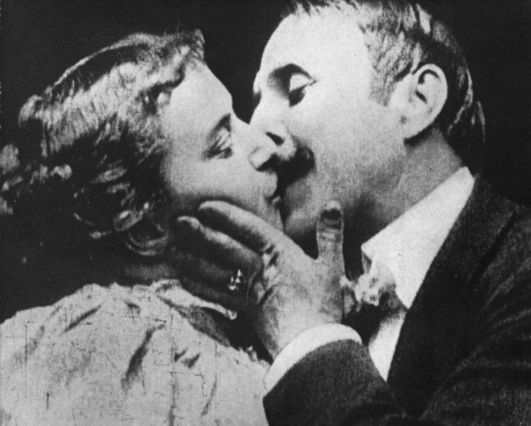Opernsänger küsst man nicht - Deutsche Oper Berlin
What moves me
No kissing of opera singers
Keep your distance! has been the watchword ever since Covid-19 appeared on the scene. There’s nothing particularly new about that, though. In Verdi’s time even lovers kept their distance when expressing their love for each other ...
Giuseppe Verdi’s final opera really was audacious in terms of what he was foisting on the audience. In FALSTAFF he gave them a young couple who were not only salacious in their declarations of love but also expected to kiss passionately onstage, according to the composer’s own notes. And, as Anselm Gerhard has attested (in “Meisterwerke – neu gehört“, published by Bärenreiter), Verdi and his librettist embedded the sounds of kissing so firmly in the score that no production managed to avoid executing the oral embrace. It was a provocation that one assumes was marginally outweighed by the respect accorded to the 80-year-old composer on the occasion of the work’s premiere in 1893 at La Scala, Milan. 19th-century opera, Gerhard tells us, was veritably prudish in this respect. Love affairs may have been a hot subject of conversation onstage, but the action tended to be at arm’s length. Be it with Verdi’s LA TRAVIATA or the young lovers in Mozart’s COSI FAN TUTTE, as far as the composers were concerned, hand kissing was as hot as it got when it came to demonstrations of the highest emotion. Even Tristan and Isolde, working themselves up to thinly veiled erotic ecstasy in their great duet in Act 2, were denied a kiss by Wagner. If real kissing is required in the opera of the time, then usually either in the form of brief gestures of friendship or as acts forced upon the damsel, which are depicted as less than decorous.
The tacit ban on kissing, of course, is more than simply a testimony to the double standards of the 19th century (when prostitution was rife); it was belated evidence that a sense of decency was long synonymous with a feeling for distance more than anything else. It was unthinkable that lovers in the opera seria of the baroque period would have licence to go further than touching fingers. Whatever went on backstage, onstage the actors had to respect the behavioural conventions of the time – especially as they tended to be playing queens, princesses and other worthy dignitaries, people who were accorded space as a token of respect and whose interactions with one another were dictated by distancing rules. This respect through distance was also a feature of dance, the main occasion for physical touching at the time. Not until the eve of the French Revolution could a dancer put his arm around the waist of his partner and not be overstepping the mark. After societal relations had been thrown into disarray by the Revolution, physical distance lost ground as a benchmark of decency, although opera, reflecting and representing the moral orthodoxy as it did, was slow in embracing the new interest in embracing. Audiences and the censor kept protagonists on a tight leash, something that is evinced by the initially cool reception given to works such as LA TRAVIATA and CARMEN.

In 1893, however, it was time for a breaking of the mould, and the fact that Verdi the maestro, of all people, chose to expose his audience to a pair of kissing lovers in FALSTAFF just goes to show how alive he was to the social shifts about to take place. Because the two youngsters, Nannetta and her lover, Fenton, are the characters to whom the future belongs. And it was a future that was not long in arriving. Three short years later, in 1896, the first kiss in the history of cinema occurred, an embrace in the short film »The Widow Jones«, which caused a stir in the press. Expectations developed to a point that a kiss in full view of an audience became an indispensable part of any love story. There was no more talk of the need for distance. Gone, too, was the idea that feelings can sometimes pack more of a punch if they are expressed solely in song. A fixation on the physical, which has long since gone beyond the mere kiss, has become a core theme in art, which now fully encompasses opera as well, even though great directors of the likes of Peter Brook, Ruth Berghaus and Robert Wilson have always used the space between characters onstage as a tool of expression. And how is it today? Do we not notice on a daily basis how different we perceive the distance we keep from each other compared with the attention we paid a year ago? That we are more keenly aware of distance, that distance is not empty space but rather something that can be filled with yearning, hatred or tension? Who can say that an onstage kiss will not come to be viewed as something truly special again? —

